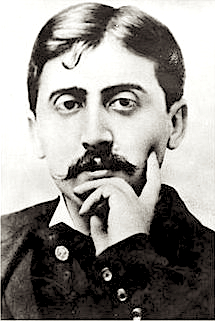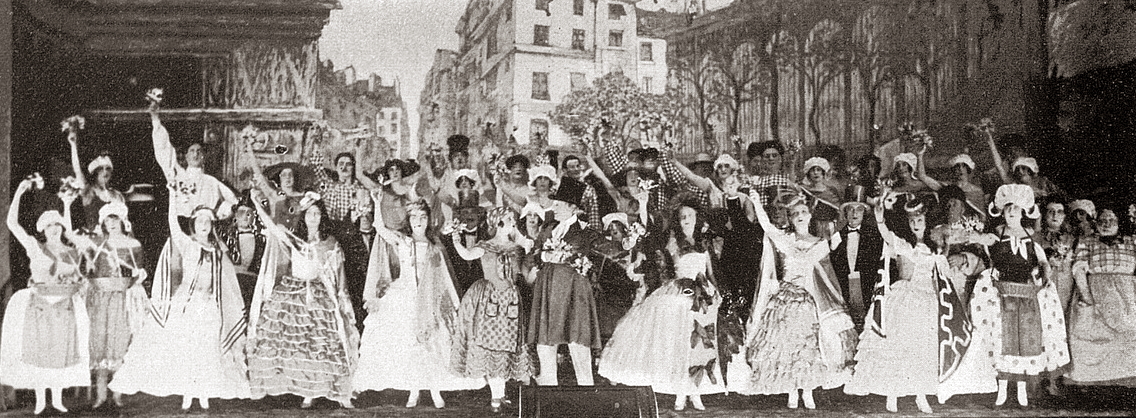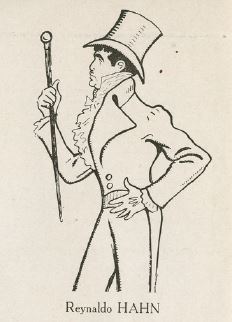Kurt Gänzl
Encylopedia of the Musical Theatre
1 January, 2001
Born in Caracas, Venezuela, on 9 August, 1874, Reynaldo Hahn was the elegant, soigné composer whose work for the French stage was much prized by his followers, though he produced only one enduring score.

Reynaldo Hahn sitting at the piano, painted by Lucie Lambert in 1907.
A student at the Paris Conservatoire from an early age, the young and dashing Hahn made a name and a place for himself in Parisian fin-de-siècle society, playing and singing his settings of literary verse at fashionable salons. The songs found other and more famous interpreters, and Hahn many influential and important friends, as he expanded his musical horizons to take in theatre music, ballets for both the Opéra and Diaghilev (Le Dieu bleu), concert works and conducting.

Novelist Marcel Proust, Hahn’s lover and lifelong friend.
At the same time he both began what would be a long and highly considered career as a music critic, and whilst still in his twenties he completed the composition of two substantial lyric stage works, the 3-act, Pierre Loti-based ‘idylle polynésienne’ L’Ïle du rêve (23 March 1898, lib: André Alexandre) and the 4-act La Carmélite (16 December 1902), both of which were staged at the Opéra-Comique.
Other lyric works followed, amongst them the opera Nausicaa (Monte Carlo/Opéra-Comique) and the 1-act ‘conte lyrique japonais’ La Colombe du Bouddha (Cannes, 1921), whilst a pantomime composed to a rhythmic poem by Edmond Rostand, Le Bois sacré, was produced at the Théâtre Sarah Bernhardt (20 April 1910). He had a first brush with the light musical theatre when he contributed to Miousic, the unsuccessful revue-opérette by ten composers fabricated for L’Olympia in 1914.
Hahn finally achieved an enduring popular theatrical success, as opposed to appreciation from artistic society, with the production of the pretty opérette Ciboulette at the Théâtre des Variétés in 1923.

A scene from Reynado Hahn’s “Ciboulette,” 1923. (Photo: Henri Manuel / Les Modes, June 1923)
The songs which he provided for Yvonne Printemps in the musical play Mozart, also proved successful as an adjunct to the music of Wolfgang Amadeus and the sprightly comic romance of Sacha Guitry, and another pastel period piece with Brummell (1931) for its hero won fond friends, but further stage ventures in opérette and musical comedy with Le Temps d’aimer (1926) Guitry’s O, mon bel inconnu (1933) and Malvina (1935), in opera (Le Marchand de Venise, 1935), and in revue (Une revue, 1926) had an often more limited appeal and shorter lives. Having in his middle age become a considerable and influential figure in Parisian musical circles, Hahn ultimately left the critic’s chair at Le Figaro, which he had occupied for a decade, and became Director of the Paris Opéra in 1945, shortly before his death.

A caricature of Reynaldo Hahn as Beau Brummell by Rip (Georges Gabriel Thenon), 1931.
Hahn’s refined, correct style of writing, with its tasteful shades, gentle charms and general absence of highly coloured passion or obviously popular attractions, has always appealed to commentators, who are inclined to find alibis for the quick disappearance of each of his failed works or to blame public lack of good taste for his limited success. It is perhaps that very good taste in his writing which has rendered it more interesting to and appreciated by musicians than popular with the general public.
He died in Paris on 28 January, 1947.
1923 Ciboulette (Robert de Flers, Francis de Croisset) Théâtre des Variétés 7 April
1925 Mozart (Sacha Guitry) Théâtre Édouard VII 2 December
1926 Le Temps d’aimer (Hugues Delorme/Pierre Wolff, Henri Duvernois) Théâtre de la Michodière 6 November
1931 Brummell (Rip, Robert Dieudonné) Folies Wagram 17 January
1933 O, mon bel inconnu (Guitry) Théâtre des Bouffes-Parisiens 12 October
1935 Malvina (Maurice Donnay, Duvernois) Théâtre de la Gaîté-Lyrique 23 March
1949 Le ‘Oui’ des jeunes filles (René Fauchois) Opéra-Comique 21 June
Biography: Gavoty, B: Reynaldo Hahn, le musicien de la Belle Époque (Buchet/Chastel, Paris, 1976)
